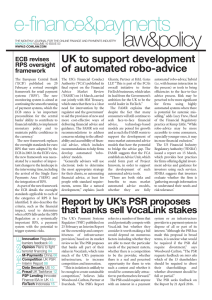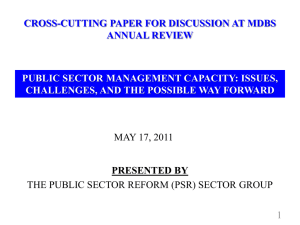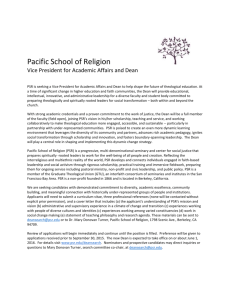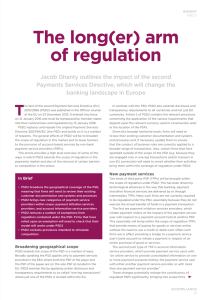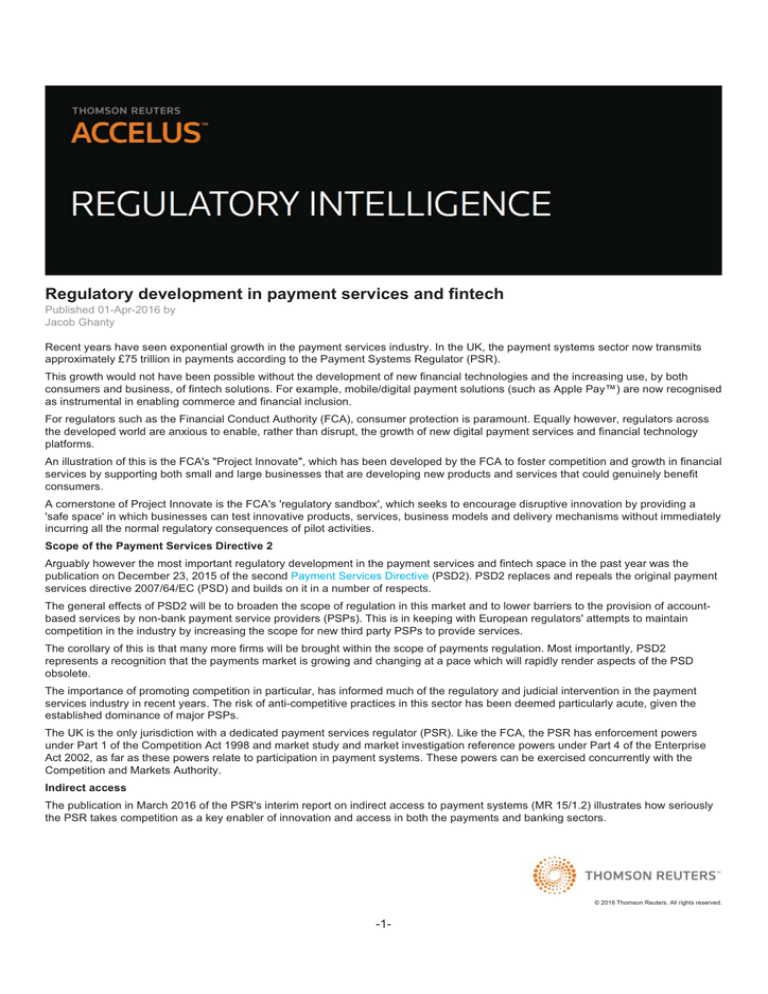
Regulatory development in payment services and fintech
Published 01-Apr-2016 by
Jacob Ghanty
Recent years have seen exponential growth in the payment services industry. In the UK, the payment systems sector now transmits
approximately £75 trillion in payments according to the Payment Systems Regulator (PSR).
This growth would not have been possible without the development of new financial technologies and the increasing use, by both
consumers and business, of fintech solutions. For example, mobile/digital payment solutions (such as Apple Pay™) are now recognised
as instrumental in enabling commerce and financial inclusion.
For regulators such as the Financial Conduct Authority (FCA), consumer protection is paramount. Equally however, regulators across
the developed world are anxious to enable, rather than disrupt, the growth of new digital payment services and financial technology
platforms.
An illustration of this is the FCA's "Project Innovate", which has been developed by the FCA to foster competition and growth in financial
services by supporting both small and large businesses that are developing new products and services that could genuinely benefit
consumers.
A cornerstone of Project Innovate is the FCA's 'regulatory sandbox', which seeks to encourage disruptive innovation by providing a
'safe space' in which businesses can test innovative products, services, business models and delivery mechanisms without immediately
incurring all the normal regulatory consequences of pilot activities.
Scope of the Payment Services Directive 2
Arguably however the most important regulatory development in the payment services and fintech space in the past year was the
publication on December 23, 2015 of the second Payment Services Directive (PSD2). PSD2 replaces and repeals the original payment
services directive 2007/64/EC (PSD) and builds on it in a number of respects.
The general effects of PSD2 will be to broaden the scope of regulation in this market and to lower barriers to the provision of accountbased services by non-bank payment service providers (PSPs). This is in keeping with European regulators' attempts to maintain
competition in the industry by increasing the scope for new third party PSPs to provide services.
The corollary of this is that many more firms will be brought within the scope of payments regulation. Most importantly, PSD2
represents a recognition that the payments market is growing and changing at a pace which will rapidly render aspects of the PSD
obsolete.
The importance of promoting competition in particular, has informed much of the regulatory and judicial intervention in the payment
services industry in recent years. The risk of anti-competitive practices in this sector has been deemed particularly acute, given the
established dominance of major PSPs.
The UK is the only jurisdiction with a dedicated payment services regulator (PSR). Like the FCA, the PSR has enforcement powers
under Part 1 of the Competition Act 1998 and market study and market investigation reference powers under Part 4 of the Enterprise
Act 2002, as far as these powers relate to participation in payment systems. These powers can be exercised concurrently with the
Competition and Markets Authority.
Indirect access
The publication in March 2016 of the PSR's interim report on indirect access to payment systems (MR 15/1.2) illustrates how seriously
the PSR takes competition as a key enabler of innovation and access in both the payments and banking sectors.
© 2016 Thomson Reuters. All rights reserved.
-1-
At present, PSPs rely mostly on Barclays, HSBC, Lloyds and RBS to provide indirect access to the major UK retail payment systems.
Some have suggested that this creates unnecessary burdens for many indirect PSPs (IPSPs) and in fact, represents an anticompetitive barrier.
Specifically the PSR is concerned that the limited choice available to smaller IPSPs constrains their ability to negotiate on price or find
an alternative provider when they are dissatisfied with the service they have received.
The review covered all main interbank payment systems and its aim was to ensure that all PSPs get a good deal in the market for
indirect access to payment systems.
The PSR hopes to address this issue by supporting existing initiatives rather than regulating further at this stage. In particular it intends
to lend support to a number of businesses that are planning to start offering indirect access or expand their current services, bringing
more choice to banks, building societies and other PSPs that require these services.
It has also committed to encourage development of improved and alternative access models for interbank payment systems that are
emerging, including the development of aggregator arrangements for Faster Payments.
Market infrastructure
The interim report on indirect access follows hard on the heels of the PSR's publication of its interim report into ownership and
competitiveness of infrastructure that supports the UK's payment systems.
The PSR is concerned that the ownership of (i) Bacs, FPS and LINK, and (ii) the central infrastructure for these systems (Vocalink) is
concentrated in the hands of a small number of banks. Although the PSR recognises that this has assisted the development of a robust
and relatively cost-effective payments infrastructure, it feels that this concentration of ownership limits competition and innovation
and may allow the banks to influence developments in a manner consistent with their own interests rather than those of all PSPs and
consumers.
The remedies proposed by the PSR include a competitive procurement process for the provision of infrastructure services, potential
divestment by the banks of their interest in Vocalink and a common international messaging standard adopted for Bacs, Faster
Payments and LINK.
Closing thoughts
Regulation of the payments space is undoubtedly changing rapidly, however some themes are consistent. Principally, regulators are
keen to foster competition but are reluctant to use a stringent and inflexible rules-based approach to achieving this. This is in keeping
with HM Treasury's commitment to fostering a flourishing fintech sector in the UK, underpinned by payment systems which enable
innovation.
Produced by Thomson Reuters Accelus Regulatory Intelligence
14-Apr-2016
© 2016 Thomson Reuters. All rights reserved.
-2-



